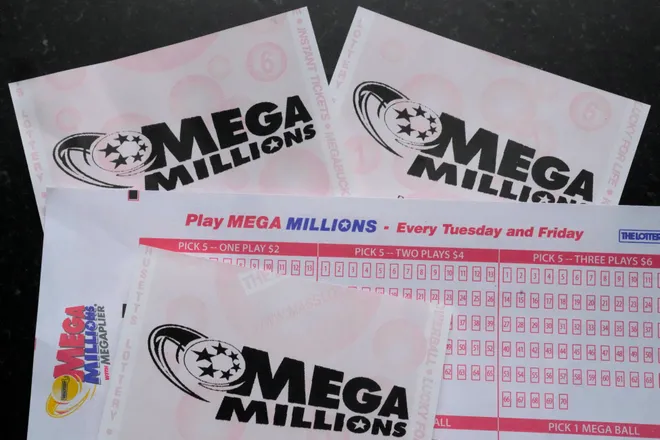Mega Millions is up to $1.55B. No one is winning, so why do we keep playing the lottery?
You know you're not going to win. Still, you can't help but buy a ticket. Why?
People across the country have lined up at local gas stations and grocery stores to purchase lottery tickets in the hopes of scoring the Mega Millions jackpot, currently sitting at about $1.55 billion with a $757.2 million cash option. Mega Millions drawings are every Tuesday and Friday night at 11 p.m. EDT.
If won, it will be the largest prize awarded in the lottery's history; however, the odds of winning remain astronomically small − 1 in 302.6 million, to be exact. For context, you're more likely to get killed by a shark, fatally hit by a meteor, struck by lightning or accepted into Harvard.
You're also more likely to worsen your mental health in the process of playing the lottery, experts say.
"If you're struggling with your bills and you're looking to make the money through buying scratchers or playing the lottery, and you lose that money, it's money that you really can't afford to lose," Steve Kobashigawa, a marriage and family therapist specializing in addiction, says. "Of course, it creates more stress, anxiety, depression, and it has a very significant impact on mental health."

When does playing the lottery become a problem?
If the odds of winning the lottery are so low, why do people bother playing? Dan Field, a therapist specializing in gambling addiction treatment, says the lottery holds such a prominent place in American culture because it gives people the opportunity to indulge in fantasies about how their lives could change if they win.
"There's this desire to be financially unburdened and free − the fantasy that I'm going to always have enough money to do whatever I want, and no one is going tell me what I do," he says. "That fantasy can become almost an obsession for some people."
It also becomes a problem, he says, when people of lower socioeconomic status see the lottery as their only chance of joining the ranks of the mega-wealthy.
"With gambling, like with other activities, it can become a single-minded focus, and all other avenues of potential joy fade away," Field says. "They're not as important as the gambling activity."
Someone not drinking alcohol?It's none of your business.
Most people are able to play lotteries for fun without falling into addictive or destructive patterns. For example, Kobashigawa notes, only about 2% of people in California, the state with the third largest lottery sales in 2022 according to Statista, suffer from a severe gambling disorder or pathological gambling addiction.
Still, when gambling addictions occur, they can wreak disastrous consequences, including job loss, homelessness, family fractures, bankruptcy and criminal activity, like fraud and embezzlement, he says.
"It isn't a very large number, but when it does happen, it's pretty significant," Kobashigawa says, adding he's worked with many clients who became addicted to buying lottery tickets. "There's a very high prevalence of suicidal ideation and suicide with people who struggle with gambling disorder. It's very, very serious."
Is alcohol considered a drug?Explaining its addictiveness and its effect on your body.
How to play the lottery without getting carried away
If you do play the lottery, experts say to keep these tips in mind:
- Only buy tickets with discretionary income: "Have a budget in mind, especially when it comes to the Powerball and Mega Millions," says Jared James, the founder of Lotto Edge, which seeks to educate people about the odds of winning lotteries. "If you don't have a hundred dollars to spend, don't be spending a hundred dollars."
- Be mindful of why you want to play: It's fine to play the lottery for fun, Kobashigawa says, but if you feel you need to win in order to recoup lost money, stop.
- Don't hang your hopes and dreams on winning: "The lottery is supposed to be fun and entertainment," James says. "Where it gets difficult is when people view it as their only way out of a financial situation. ... When you get into that mindset, it's really setting yourself up for a perpetual grief."
- Check in with your feelings: "If you play and you get really depressed or something after you're playing and it becomes such an emotional investment, maybe it's time to take a look at that as well, because, again, this is supposed to be fun," James says.
- Notice illogical thoughts: If you get obsessive about buying lottery tickets with supposedly lucky numbers or from a particular liquor store, take note. Field says magical thinking can be a sign playing the lottery has become unhealthy.
- Get help if you need it: If you find that you've become addicted to the lottery or another form of gambling, seek help from a mental health professional or a self-help group like Gamblers Anonymous, Kobashigawa says.
Alcohol's busiest season in here:How to avoid binge drinking and support sober loved ones
Disclaimer: The copyright of this article belongs to the original author. Reposting this article is solely for the purpose of information dissemination and does not constitute any investment advice. If there is any infringement, please contact us immediately. We will make corrections or deletions as necessary. Thank you.







